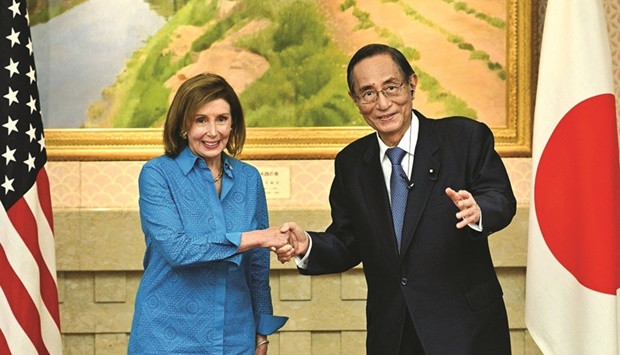China yesterday announced it was halting dialogue with the US in a number of areas, including between theater-level military commanders and on climate talks, in an escalating furore over House Speaker Nancy Pelosi’s visit to Taiwan.
China’s foreign ministry said it was also suspending co-operation with Washington on prevention of cross-border crime and drug trafficking, an area along with climate change where US officials see opportunity for co-operation.
Enraged after Pelosi became the highest-level visitor in 25 years to the self-governed island that Beijing regards as its sovereign territory, China launched military drills in the seas and skies around Taiwan on Thursday.
The live-fire drills, the largest-ever conducted by China in the Taiwan Strait, are scheduled to continue until noon tomorrow.
Taiwan’s defence ministry said yesterday a total of 68 Chinese military aircraft and 13 navy ships were conducting missions in the sensitive Taiwan Strait.
Some of them, they said, crossed an official buffer separating the two sides, a move the ministry described as “damaging the status quo”.
US Secretary of State Antony Blinken said Washington has repeatedly made clear to Beijing it does not seek a crisis over Pelosi’s visit to Taiwan, which took place on Wednesday during a congressional tour of Asia.
“There is no justification for this extreme, disproportionate and escalatory military response,” Blinken told a news conference on the sidelines of the Asean Regional Forum in Cambodia.
He added, “now, they’ve taken dangerous acts to a new level”.
China’s military yesterday conducted air and sea drills to the north, southwest and east of Taiwan “to test the troops’ joint combat capabilities”, the Eastern Theater Command of the People’s Liberation Army (PLA) said in a statement.
Blinken emphasised that the US would not take actions to provoke a crisis, but it would continue to support regional allies and conduct standard air and maritime transit through the Taiwan Strait.
“We will fly, sail and operate wherever international law allows,” he said.
The White House summoned Chinese ambassador Qin Gang on Thursday to condemn the escalating actions. That followed Beijing’s summoning of US ambassador Nicholas Burns early this week over Pelosi’s Taiwan visit.
Representatives for the state department did not immediately reply to a request for comment on China’s halting of talks and co-operation on several fronts.
The Chinese comments did not mention a suspension of military talks at the senior-most levels, such as with US Defence Secretary Lloyd Austin and chairman of the joint chiefs of staff General Mark Milley.
While those talks have been infrequent, officials have said they are important to have in the case of an emergency or accident.
Beijing separately announced that it would personally impose sanctions on Pelosi and her immediate family in response to her “vicious” and “provocative” actions.
“Despite China’s serious concerns and firm opposition, Pelosi insisted on visiting Taiwan, seriously interfering in China’s internal affairs, undermining China’s sovereignty and territorial integrity, trampling on the one-China policy, and threatening the peace and stability of the Taiwan Strait,” a Chinese foreign ministry spokesperson said in a statement.
Speaking in Japan, Pelosi said her trip to Asia was never about changing the regional status quo.
Taiwan’s defence ministry said the island’s military had dispatched aircraft and ships and deployed land-based missile systems to monitor ships and aircraft that briefly crossed the Taiwan Strait median line.
On Thursday, China fired multiple missiles into waters surrounding Taiwan.
Japan’s defence ministry, which is tracking the exercises, first reported that as many as four of the missiles flew over Taiwan’s capital, which is unprecedented.
It also said that five of nine missiles fired toward its territory landed in its exclusive economic zone (EEZ), also a first, prompting a diplomatic protest by Tokyo.
Later, Taiwan’s defence ministry said the missiles were high in the atmosphere and constituted no threat.
It gave no details of their flight paths, citing intelligence concerns.
Some Taipei residents, including mayor Ko Wen-je, criticised the government for not putting out a missile alert, but one security expert said that could have been done to avoid stoking panic and playing into China’s hands.
Snickers maker sorry for
Mars Wrigley, maker of the Snickers candy bar, yesterday apologised for a Snickers product launch which Chinese social media users said suggested that Taiwan was a country.
Videos and pictures showing a Snickers website promoting a limited edition Snickers bar and saying the product was only available in the “countries” of South Korea, Malaysia and Taiwan triggered an outpour of anger on Chinese microblogging platform Weibo yesterday.
Mars Wrigley later published an apology on its Snickers China Weibo account and said the relevant content had been amended.
“Mars Wrigley respects China’s national sovereignty and territorial integrity and conducts its business operations in strict compliance with local Chinese laws and regulations,” Mars Wrigley added.
However, the social media backlash did not abate as many users were irate that the US company’s statement did not say Taiwan was a part of China, a cornerstone of Chinese foreign policy.
“Say it: Taiwan is an inseparable part of China’s territory!” read one comment underneath the post on Snickers China Weibo account that received 8,000 likes.
Beijing considers Taiwan to be part of its territory and has never renounced using force to bring the island under its control.
Taiwan rejects China’s sovereignty claims and says only its people can decide the island’s future.
Snickers joins a long list of foreign brands that have been forced to apologise after being called out by Chinese social media users for not using Beijing’s preferred nomenclature for the island: Taiwan province or Taiwan (China). Taiwan advert

US House Speaker Nancy Pelosi shakes hands with Hiroyuki Hosoda, Speaker of Japan’s House of Representatives, during a meeting in Tokyo yesterday.
